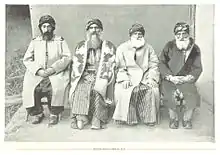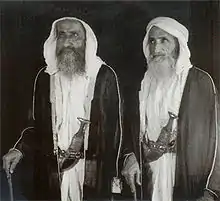Sheikh
Sheikh (/ʃeɪx/ SHAYKH, /ʃiːk/ SHEEKH; Arabic: شيخ šayḫ [ʃajx], mostly pronounced [ʃeːx], plural شيوخ šuyūḫ [ʃuju:x])—also transliterated sheekh (Iraq), sheik, sheyikh, shaykh, shayk, sheikh, shekh, shaik and shaikh—is an honorific title in the Arabic language. It commonly designates a chief of a tribe or a royal family member. It is also commonly used to refer to a Muslim religious scholar. The term can be literally translated to "Elder".
Etymology and meaning

The word in Arabic stems from a triliteral root connected with age and aging: ش-ي-خ, shīn-yā'-khā'. The title carries the meaning leader, elder, or noble, especially in the Arabian Peninsula within the Tribes of Arabia, where shaikh became a traditional title of a Bedouin tribal leader in recent centuries. Due to the cultural impact of Arab civilization, and especially through the spread of Islam, the word has gained currency as a religious term or general honorific in many other parts of the world as well, notably in Muslim cultures in Africa and Asia.
Sufi term
In Sufism, the word sheikh is used to represent a wali who initiates a particular tariqa which leads to Prophet Muhammad, although many saints have this title added before their names out of respect from their followers. A couple of prominent examples are Shaikh Abdul Qadir Jilani, who initiated the Qadiriyya order, and Shaikh Ahmad al-Tijani, who initiated the Tijaniyyah sufi order.[1]
Regional usage
Arabian Peninsula

In the Arabian Peninsula, the title is used for chiefs of tribes. This also includes royalty in most of the Arab states of the Persian Gulf, where the royal families were traditionally considered tribal chiefs. For example, it is used by the UAE Al-Nahyan dynasty and Al Maktoum dynasty, who are considered the chiefs of the Bani Yas tribe, and by Kuwait's Al Sabah dynasty and Bahrain's Al Khalifa dynasty of the Bani Utbah tribal confederation. The term is used by almost every male and female (sheikha) member of the royal houses of the UAE, Bahrain, Qatar, and Kuwait. The title is not used by members of Al Saud of Saudi Arabia, where the title "Prince" (Arabic: أمير, romanized: ʾAmīr) is used instead.
The title is also used to refer to religious leaders for both Sunni and Shia Muslims. For example, the Saudi Arabian family Al ash-Sheikh (literally House of the Sheikh) is named after the religious leader and eponymous founder of Wahhabism, Muhammad ibn Abd al-Wahhab.
Lebanon
In Mount Lebanon, the title had the same princely and royal connotation as in the Arabian peninsula until the Ottoman invasion in 1516, since it represented an indigenous autonomous "sui iuris" ruler or tribal chief.[2] Examples of some ancient families that hold the title of "sui iuris" sheikh is the Al-Chemor family, ruling since 1211 CE in Koura and Zgharta until 1747 CE[3][4][5] and the Boudib Family (descendants of the Hashemite Family) who were Ehdenian rulers of Jebbeh since 1471 CE until 1759 CE. Descendants of this royal family now live in Miziara, Mexico and Nigeria.[6] Even the Abu Harmoush family, which ruled the Chouf region until the Battle of Ain Dara in 1711 CE. After the Ottoman rule and the implementation of the Iltizam system, the title gained a noble instead of royal connotation, since it was bestowed by a higher authority; in this case the Ottoman appointed Emir, who was nothing more than a mültezim or tax collector for the empire.[7] Some very influential Maronite families, who had the title bestowed upon them, are (in chronological order): El Hachem of Akoura (descendants of the Hashemite Family, since 1523), El-Khazen (since 1545), Hubaysh of Kisrawan and Douaihy of Zgharta. Other families who are nowadays addressed or known as "sheikhs" were not traditionally rulers of provinces, but instead they were high-ranking officials at the service of the Emir at that time.
Maghreb
In the Maghreb, during the Almohad dynasty, the caliph was also counseled by a body of shaykhs. They represented all the different tribes under their rules, including Arabs, (Bedouins), Andalusians and Berbers and were also responsible for mobilizing their kinsmen in the event of war.[8]
Horn of Africa

In the Muslim parts of the Horn of Africa, "sheikh" is often used as a noble title. In Somali society, it is reserved as an honorific for senior Muslim leaders and clerics (wadaad), and is often abbreviated to "Sh".[9] Famous local sheikhs include Abdirahman bin Isma'il al-Jabarti, an early Muslim leader in northern Somalia; Abadir Umar Ar-Rida, the patron saint of Harar; Abd al-Rahman al-Jabarti, Sheikh of the riwaq in Cairo who recorded the Napoleonic invasion of Egypt; Abd Al-Rahman bin Ahmad al-Zayla'i, scholar who played a crucial role in the spread of the Qadiriyyah movement in Somalia and East Africa; Shaykh Sufi, 19th century scholar, poet, reformist and astrologist; Abdallah al-Qutbi, polemicist, theologian and philosopher best known for his five-part Al-Majmu'at al-mubaraka ("The Blessed Collection"); and Muhammad Al-Sumaalee, teacher in the Masjid al-Haram in Mecca who influenced many of the prominent Islamic scholars of today.[10]
South Asia

In South Asia it is not an ethnic title but an occupational title[11][12] attributed to Muslim trading families with Arab lineage. After the advent of Islam in South Asia, (Brahmins, Rajputs, Khatris, Kayasthas and vaishya) tribes also converted to Islam and adopted the title.[13]In Punjab, Pakistan the Hindu Brahmins, Kshatriya, Rathores, Bhattis, Chauhans, manihar and other Rajput converted by different Ismaili Pirs to Islam. Ismaili Pirs gave the new converts of Punjab the hereditary title of Shaikh as well as the Muslims who immigrated from Central Asia[14] and settled in Punjab adopted this title.
Distinguished Sindhi Shaikhs include Imtiaz Shaikh, MPA Shikarpur and Special Advisor to PM and Former Provincial Minister and Bureaucrat, Sindh; Shaikh Ayaz, Sindhi poet of Pakistan; Najmudddin Shaikh, Former Foreign Secretary, Pakistan; Ghulam Shabir Shaikh, Former IGP Sindh, Pakistan; Dr. Abdul Hafeez Shaikh, Federal Finance Minister, Pakistan; Muhammad Ayub Shaikh, Chairman Employees' Old Age Benefits Institution], Pakistan; Maqbool Shaikh, Former Provincial Minister for Food and Health, Sindh; Faraz Shaikh, Chairman Sindh Naujawan Shaikh Ittehad, Sindh; Faryaz Nisar Shaikh, Vice Chairman Sindh Naujawan Shaikh Ittehad, Sindh; Arsalan Nafees Shaikh Bagri, president Shaikh Ittehad District Thattha Wing; Imam Bux Shaikh, Former General Secretary Peoples Students Federation Karachi, Former General Secretary Peoples Engineers Forum Sindh, Famous Student Leader of Pakistan.
Southeast Asia
In Indonesia and other parts of Southeast Asia, sheikhs are respected by local Muslims. In Indonesia, the term is usually spelled "syech", and this is usually attributed to elderly ulama. Higher knowledgeable people of Islamic studies in Indonesia are usually referred to as "ustad" or "kyai".
Iran

From the perspective of Iran, the word or title of sheikh possesses diverse meanings, among individuals who are aged and wise, it has been a honorific title used for elders and learned scholars, such as: Sheikh al-Rayees Abu Ali Sina, Sheikh Mufid, Sheikh Morteza Ansari. In the past, Islamic scholars who were the Islamic prophet Muhammad's descendants, were called Sayyid/Seyyed instead of sheikh.[15]
For women
Historically, female scholars in Islam were referred to as shaykhah (Arabic: شيخة) (alt. shaykhat). Notable shaykha include the 10th-century Shaykhah Fakhr-un-Nisa Shuhdah[16] and 18th-century scholar Al-Shaykha Fatima al-Fudayliyya.[17]
A daughter or wife or mother of a sheikh is also called a shaykhah. Currently, the term shaykhah is commonly used for women of ruling families in the Arab states of the Persian Gulf, with the exception of Oman.
See also
- Allamah
- Al ash-Sheikh – Saudi Arabia's leading religious family
- Ayatollah
- Kashmiri Shaikh
- Khawaja Shaikh
- List of marjas - The supreme legal authority for twelver Shia Muslims
- List of Ayatollahs
- Manihar
- Punjabi Shaikh
- Qallu
- Qanungoh Shaikh
- Shaykhism
- Shaikhs in South Asia
- Sindhi Shaikh
Notes
- Abun-Nasr, Jamil M. (2007). Muslim Communities of Grace: The Sufi Brotherhoods in Islamic Religious Life. Columbia University Press. p. 94. ISBN 978-0-231-14330-1.
- A House of Many Mansions: The History of Lebanon Reconsidered, 2001, Kamal Salibi
- National News Agency - Ministry of Information Lebanese Republic, 2014 http://nna-leb.gov.lb/ar/show-report/371/
- Book Al-Sheikh Al-Chemor Al-Hakum Al-Akoura Al-Hakum Al-Zawyia, Ignatios Tannous Al-Khoury, Beirut, 1948, pg.123
- "Tārīkh al-ṭāʼifah al-Mārūnīyah (Microform, 1890)". [WorldCat.org].
- El - Doaihi. A glimpse into the History of Ehden The Most Legendary Ehdenian Battles (2000BC - 1976).
- Lebanon's Predicament, 1987, Samir Khalaf
- Niane, Djibril Tamsir; Africa, Unesco International Scientific Committee for the Drafting of a General History of (1 January 1984). Africa from the Twelfth to the Sixteenth Century. UNESCO. ISBN 9789231017100. Retrieved 19 February 2017 – via Google Books.
- IFLA Committee on Cataloguing, IFLA International Office for UBC., IFLA International Programme for UBC., IFLA UBCIM Programme (1987). International cataloguing: quarterly bulletin of the IFLA Committee on Cataloguing, Volume 11. The Committee. p. 24.CS1 maint: multiple names: authors list (link)
- "Scholars Biographies - 15th Century - Shaykh Muhammad ibn 'Abdullaah as-Sumaalee". Fatwa-Online. Archived from the original on 15 September 2012. Retrieved 26 August 2012.
- "Pakistan a country study p149". 1975.
- Robinson, Rowena (20 February 2004). Sociology of religion p90. ISBN 9780761997818.
- Khanam, Azra (30 August 2013). Muslim backward classes: a sociological perspective. ISBN 9788132118077.
- Kaw, Mushtaq A. (January 2010). Central Asia in Retrospect and prospect p406. ISBN 9789380009322.
- Who/what is Sheikh? porseshkadeh.com Retrieved 28 Oct 2018
- "Shaykhah Shuhdah, Fakhr-un-Nisa". Haq Islam. Retrieved 9 February 2015.
- Siddiqi, Muhammad Zubayr (1993). "Hadith Literature Its origin, development and special features: Women Scholars of Hadith". The Islamic Texts Society Cambridge: 117–123. Retrieved 23 February 2015.
External links
 The dictionary definition of sheik at Wiktionary
The dictionary definition of sheik at Wiktionary